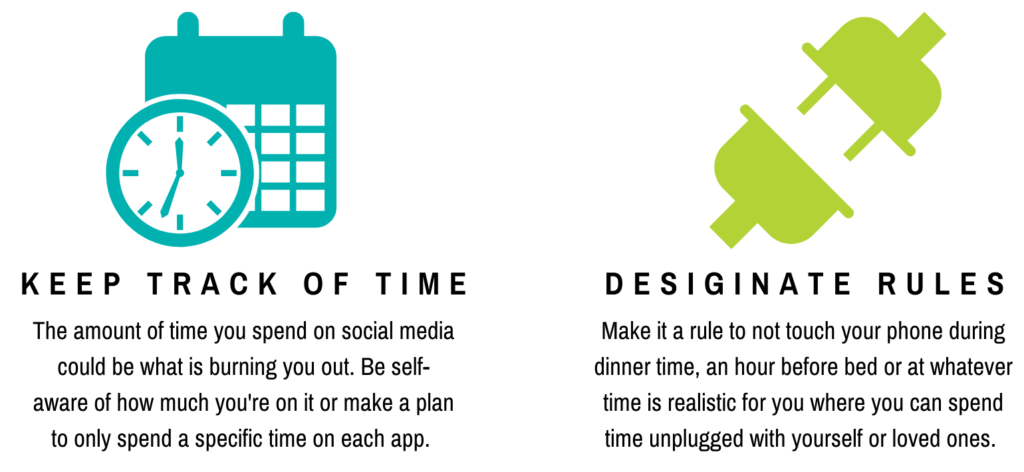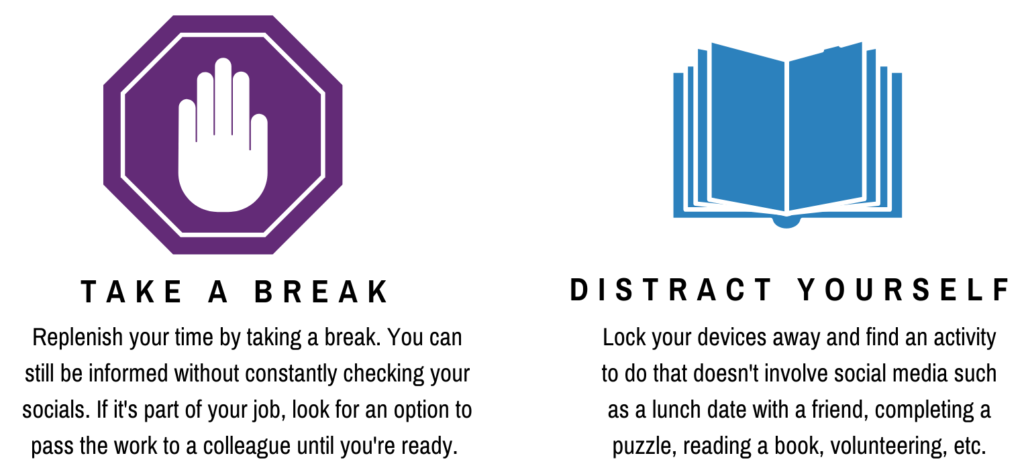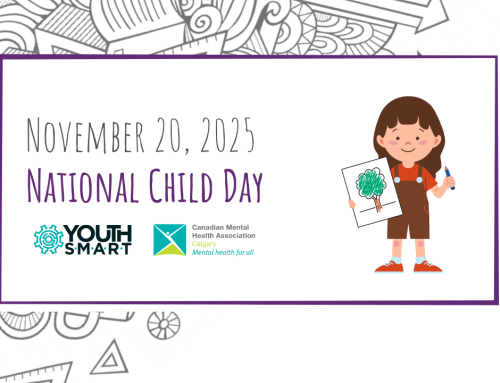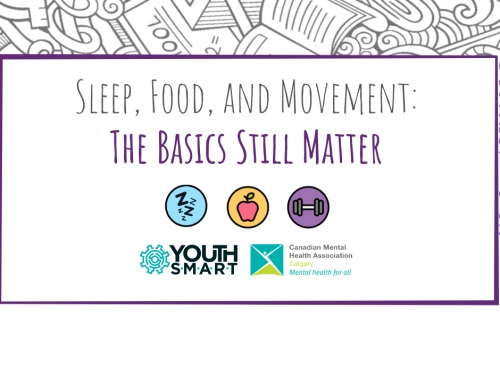Have you ever felt exhausted after spending a little too much time on your phone scrolling through your social media feeds? It’s not just you. This is a common occurrence called social media burnout.
The term “burnout” refers to a state of emotional, physical, and mental exhaustion caused by a long-term period of stress. The feeling of burnout occurs when you feel overwhelmed and emotionally drained the majority of the time.¹
Signs of Burnout
Research states that burnout may be the result of unyielding stress; it is not the same as being too stressed. Stress involves immense pressure physically or mentally with the expectation that there is an end in sight whereas being burnout involves total mental exhaustion and a complete lack of motivation.²
Most of us, especially in these generations, use social media daily. This means your friends, family members, classmates, teammates, teachers, coaches, etc.
Not only are we consuming digital content, but perhaps creating it as well. Some people have even entered influencer status creating chances to make money by using various social media platforms. Whether you are using social media personally or professionally, any extended use may eventually result in burnout feelings such as;
- The constant need to check your phone
- Feeling defeated and/or overwhelmed
- Feeling mentally exhausted
- The fear of missing out (FOMO)
- A sense of detachment
- Cynical and/or negative
- Drained and/or unmotivated
Despite the ingenuine light social media often creates, it still manages a way to grip a sense of dependence within us.
“Authentic” Media Overload
Social media has the effect to burn out its audience based on the overwhelming amount of information that is constantly posted throughout online social media platforms such as Facebook, Twitter, Instagram, Snapchat, Tik Tok, YouTube, Reddit, etc.
Although social media platforms were ultimately created to share and connect with family, friends, classmates, etc. – it has also become the source for a lot of anxieties and triggers.

No matter the content that is posted, every social media user is putting out a certain vibe about their lifestyle. This can unintentionally make people feel different types of ways about their social media feeds or their own lifestyle.
In this day and age, social media has become everyone’s “highlight reel,” which means the best part of people’s day-to-day is now their perceived online identity. Even though everyone’s highlight reel is different, and sometimes unrealistic, it still welcomes comparison – a very toxic component of social media.
Comparing to different profiles is one of the common ways many users, especially youth, can personally burnout on social media based on ideas that they don’t have what another person does whether it’s accomplishments, a certain appearance, a following, etc.
The Not-So Good Side of Social Media
Sometimes the information that pops up on your social media feeds is out of your control because of programmed algorithms based on relevancy, viewing habits and behaviours.
The phrase bad news travels fast is a saying that accurately depicts the popular side of social media and their algorithms because that is what’s usually broadcasted and highlighted onto social media feeds – tragic breaking news, photographs and videos of violence, destruction, injustices, death, etc.

Social media burnout is different for everyone. These are some areas that cause burnout based on the amount its broadcasted onto social media feeds as well as the care factor people have for these topics.
Now a days people tend to feel defeated based on the increasing amount of problems arising on social media that tend to look out of reach of their help. Even though it’s important to stay current with what is going on around the world and put your best foot forward to do the right thing for causes you believe in – it is just as important to keep your mental health in check.
Tips to Manage Social Media Burnout
Below are a few tactics of what you or a loved one can do if you’re feeling burnout by your social media content.

Where to Reach Out
In any case of social media burnout, recognize the signs so you can adjust and create balance in your relationship with social media again.³
If you know anyone who is suffering from burnout of any kind and needs to talk to someone, contact CMHA Calgary’s Peer Support at 403-297-1402 or peer@cmha.calgary.ab.ca.
¹ Melinda Smith, M.A., Jeanne Segal, Ph.D., and Lawrence Robinson, “Burnout Prevention and Treatment,” para. 1, Help Guide, last modified October 2020, https://www.helpguide.org/articles/stress/burnout-prevention-and-recovery.htm
² Melinda Smith, M.A., Jeanne Segal, Ph.D., and Lawrence Robinson, “Burnout Prevention and Treatment,” para. 6, Help Guide, last modified October 2020, https://www.helpguide.org/articles/stress/burnout-prevention-and-recovery.htm
³ Stephanie A. Sarkis, “Preventing Social Media Burnout,” para. 4-6, Psychology Today, posted September 27, 2018, https://www.psychologytoday.com/ca/blog/here-there-and-everywhere/201809/preventing-social-media-burnout
You are not alone. There is help.
For youth-related mental health resources, please visit http://www.breathingroom.me/, www.teenmentalhealth.org, www.mindyourmind.ca. If you cannot find someone you trust who is willing to support you, dial a crisis line right away at 403-266-HELP (4357) All crisis lines are confidential.*CMHA Calgary’s YouthSMART does not necessary support or endorse the listed community resources. We have reviewed each source, however external organizations may change content without notice.*
YouthSMART would like to thank Sagium and Kinsted Wealth for being our 2020 – 2021 website sponsor.






